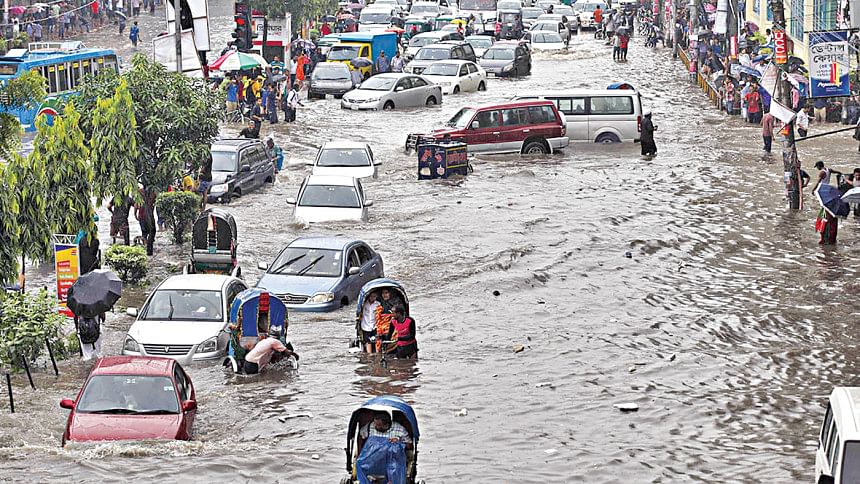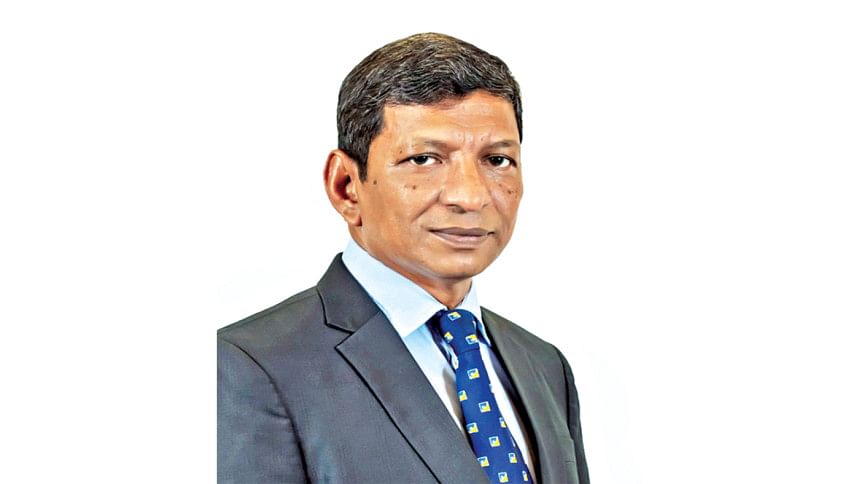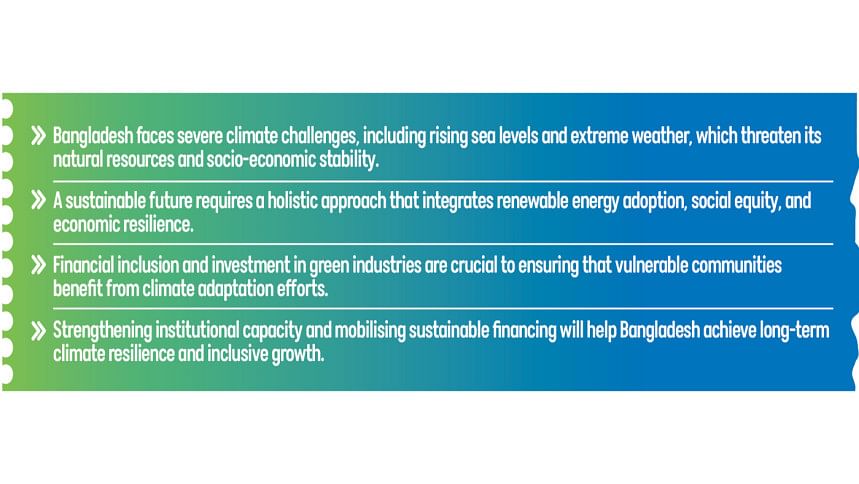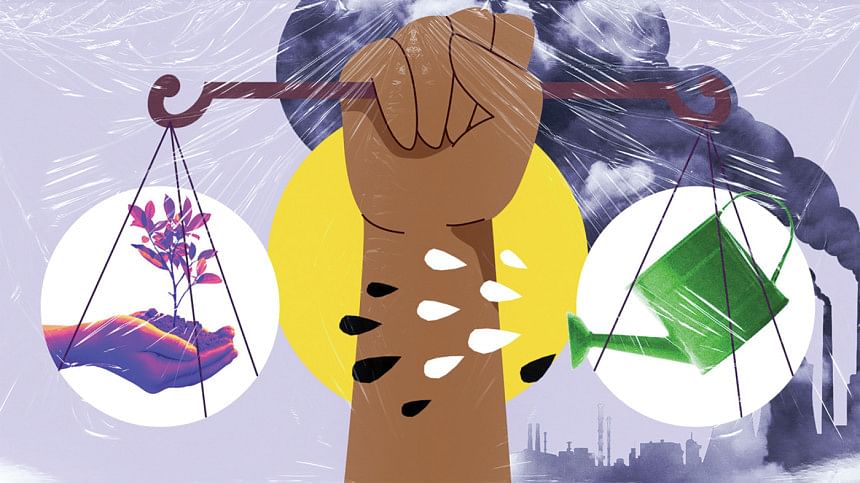Creating jobs and ensuring climate justice

Bangladesh, one of the world's most climate-vulnerable countries, faces rising sea levels, extreme weather, and unpredictable monsoons. These challenges harm the nation's natural resources and deepen socio-economic disparities, particularly for marginalised communities in rural and coastal areas. To ensure a sustainable future, Bangladesh must adopt a holistic approach to climate resilience that integrates environmental goals with social equity and economic stability.
WHAT IS SUSTAINABILITY?
Sustainability is about both people and the planet. Human activities such as deforestation, urbanisation, and burning fossil fuels are major contributors to environmental degradation. However, people are also key to reversing this damage. To mitigate the climate crisis, we must prioritise the planet's health by shifting from fossil fuels to renewable energy sources like solar, wind, and hydropower.
Many green energy initiatives will not scale sufficiently to meet the country's energy needs without adequate funding.
Fossil fuels, while central to the world's energy systems for centuries, are the primary cause of environmental degradation. Their extraction and use release vast amounts of greenhouse gases, contributing to global warming. Transitioning to renewable energy is critical for environmental reasons, long-term energy security, and economic stability. However, financing for renewable energy remains insufficient, especially in countries like Bangladesh, which currently has just 4.9 percent renewable energy in its energy mix. The government aims to achieve 15 percent renewable energy by 2030, but meeting this target will require substantial investment and commitment across sectors.
A KEY COMPONENT FOR LONG-TERM RESILIENCE
While environmental sustainability is often the main focus, social sustainability is just as crucial—especially in Bangladesh, where socio-economic inequalities are pronounced. Social sustainability ensures that all members of society have access to essential services such as healthcare, education, and economic opportunities. Without addressing social equity, climate change mitigation efforts can deepen disparities and leave vulnerable communities behind.
Bangladesh has made notable progress in reducing poverty, with the poverty rate dropping from 44.2 percent in 1991 to 18.7 percent in 2022. However, inequalities persist, particularly in rural and coastal areas, where communities depend heavily on agriculture and fishing. Climate change already affects these regions, with rising sea levels, unpredictable weather, and altered rainfall patterns threatening livelihoods.
Bangladesh must ensure that its climate adaptation efforts focus on inclusivity for long-term climate resilience. Vulnerable communities need access to resources, technology, and financing to help them adapt. Protecting the environment is important, but it is equally essential to address social inequities. A truly sustainable approach must ensure that marginalised groups have the opportunity to thrive in the green economy.

LINK BETWEEN CLIMATE CHANGE AND SOCIAL INEQUALITY
The impacts of climate change are felt most acutely by Bangladesh's coastal communities, home to millions of the nation's poorest citizens. Rising sea levels are displacing millions and threatening agriculture, an essential sector for food security and employment. According to the World Bank, Bangladesh could lose up to 6 percent of its GDP by 2050 due to climate-induced agricultural disruptions.
Small-scale farmers and fishermen in these areas are at risk as climate change increasingly threatens their livelihoods. Addressing these challenges requires more than environmental protection—it demands an inclusive approach that provides these communities with the tools, training, and financing to adapt. Investments in climate-resilient agriculture must include technology, financial support, access to markets, and affordable insurance options to safeguard against climate-related risks.
GREEN ECONOMY FOR ALL
A green economy offers Bangladesh a unique opportunity to combat climate change while promoting inclusive economic growth. This approach aims to reduce environmental harm, create jobs,
and develop socially and environmentally responsible industries. Bangladesh can accelerate its green transition by investing more in renewable energy, energy-efficient technologies, sustainable agriculture, and eco-friendly infrastructure.
The country has made significant progress in renewable energy, particularly solar power. By 2022, Bangladesh had installed over 6.3 million solar home systems, making it one of the largest off-grid solar markets globally. The government has set a goal to generate 10 percent of the country's electricity from renewable sources by 2025. However, the pace of financing for these projects remains slow. Many green energy initiatives will not scale sufficiently to meet the country's energy needs without adequate funding.
To fully leverage the green economy, Bangladesh must ensure that the benefits of the transition reach all sectors of society. Women, rural populations, and marginalised groups must have equal access to opportunities in the green economy. According to the International Labour Organization (ILO), the global green economy could create up to 18 million new jobs by 2030. Bangladesh could capture a significant share of these jobs if efforts involve underrepresented communities, particularly women, in renewable energy, sustainable agriculture, and green infrastructure.

ADDRESSING BASIC NEEDS AND PROMOTING FINANCIAL INCLUSION
While Bangladesh has made strides in reducing poverty, gaps in access to essential services remain. Around 15 percent of the population lacks access to healthcare, and many rural households have yet to connect to electricity networks. These gaps present significant challenges in building resilience against climate change. Bangladesh must invest in infrastructure, healthcare, education, and energy access for all its citizens to meet its sustainability goals.
Another crucial issue is financial inclusion. A large segment of the population remains excluded from formal financial systems, limiting their access to credit, savings, and insurance. Many small businesses, particularly rural ones, struggle to access the capital they need to grow. Despite their important economic role, women are often excluded from financial decision-making. Improving financial inclusion by expanding access to finance, education, and skills training will help accelerate the green transition and empower underserved communities.
MOBILISING FINANCING FOR SUSTAINABILITY
Achieving Bangladesh's sustainability goals requires mobilising both domestic and international resources. The government plays a critical role in creating a favourable environment for private sector investment in sustainable development. It must also ensure that financing mechanisms prioritise social equity. Bangladesh has benefited from international financing, such as the $440 million from the Green Climate Fund (GCF) for flood protection projects in 2019. However, the country still faces a significant financing gap. The Asian Development Bank (ADB) estimates Bangladesh will need $13 billion annually for climate-related projects between 2020 and 2030.
Development financial institutions (DFIs) can also help bridge this gap by providing financial resources and technical expertise. Bangladesh Bank has promoted green financing through initiatives like the Green Transformation Fund (GTF) and the Technology Development Fund (TDF). However, these mechanisms face challenges such as complex documentation and delays in disbursement. Streamlining the financing process and expanding available funds will be crucial to meeting the demand for climate-resilient projects.
BRAC BANK'S ROLE IN SUSTAINABLE FINANCING
At BRAC Bank, climate change challenges present opportunities to lead in sustainable finance. We prioritise environmental and social sustainability by supporting renewable energy projects, particularly solar, and financing energy-efficient technologies and green infrastructure. With 8.6 percent of our portfolio dedicated to climate finance, we are committed to fostering a greener future.
Bloomberg rates BRAC Bank as a top sustainable company in Bangladesh. We leverage low-cost financing from Bangladesh's central bank to make renewable energy projects more accessible and affordable. Our partnerships with DFIs like JICA, IFC, and ADB provide essential resources and expertise to scale these initiatives. Additionally, we invest in energy-efficient machinery, Effluent Treatment Plants (ETP), Water Treatment Plants (WTP), and green building projects that help reduce carbon emissions.

STRENGTHENING INSTITUTIONAL CAPACITY
To maximise the impact of sustainable financing, Bangladesh must strengthen its institutional capacity to manage and deploy funds effectively. Financial institutions must build the necessary expertise to allocate resources transparently. Additionally, local communities must be empowered to actively participate in decision-making processes, ensuring that sustainability projects meet their needs.
A HOLISTIC APPROACH TO SUSTAINABILITY
Bangladesh's path to a sustainable future requires an integrated approach that balances environmental, social, and economic priorities. Tackling climate change is essential, but it must be done in a way that promotes social equity and inclusion. Financing for sustainability must ensure that all citizens, particularly the most vulnerable, benefit from the green transition. By focusing on effective financing mechanisms, strengthening institutional capacity, and promoting social inclusion, Bangladesh can build a resilient, prosperous, and inclusive future—serving as a model for other nations facing similar climate challenges.

 For all latest news, follow The Daily Star's Google News channel.
For all latest news, follow The Daily Star's Google News channel. 



Comments